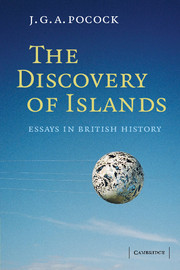Book contents
- Frontmatter
- Contents
- Preface and acknowledgements
- Note on bibliographies
- PART I THE FIELD PROPOSED
- PART II THE THREE KINGDOMS AND THE ENGLISH PROBLEM
- 3 The field enlarged: an introduction (2004)
- 4 Two kingdoms and three histories? Political thought in British contexts (1994)
- 5 The Atlantic archipelago and the War of the Three Kingdoms (1996)
- 6 The Third Kingdom in its history (2000)
- PART III EMPIRE AND REBELLION IN THE FIRST AGE OF UNION
- PART IV NEW ZEALAND IN THE STRANGE MULTIPLICITY
- PART V BRITAIN, EUROPE AND POST-MODERN HISTORY
- Bibliographies
- Index
5 - The Atlantic archipelago and the War of the Three Kingdoms (1996)
Published online by Cambridge University Press: 05 June 2012
- Frontmatter
- Contents
- Preface and acknowledgements
- Note on bibliographies
- PART I THE FIELD PROPOSED
- PART II THE THREE KINGDOMS AND THE ENGLISH PROBLEM
- 3 The field enlarged: an introduction (2004)
- 4 Two kingdoms and three histories? Political thought in British contexts (1994)
- 5 The Atlantic archipelago and the War of the Three Kingdoms (1996)
- 6 The Third Kingdom in its history (2000)
- PART III EMPIRE AND REBELLION IN THE FIRST AGE OF UNION
- PART IV NEW ZEALAND IN THE STRANGE MULTIPLICITY
- PART V BRITAIN, EUROPE AND POST-MODERN HISTORY
- Bibliographies
- Index
Summary
This paper will seek to develop a position on the history of the Atlantic archipelago in early modern times, originally stated in articles published up to eighteen years ago. Since those times a good deal has happened, and we have all gone on thinking about what is no longer ‘the unknown subject’ – though it would not be true to say that we have a governing paradigm for treating it. In developing these earlier positions, I wish to select, however tendentiously, a few positions away from which I think there has been some movement, and see if I can employ that pattern in an attempt to define where we are now.
In the first place, there is the phrase ‘Atlantic archipelago’ itself. One book has been published with that title, by an American scholar, Richard S. Tompson of Utah; on the other hand, Hugh Kearney's book is entitled The British Isles: a History of Four Nations. I offer the term in an attempt to get away from inappropriate pan-national language. The problem lies less with the term ‘British Isles’ than with the term ‘British history’, a concept to which there are or might be objections on various nationalist grounds, but which we have been employing speculatively and aggressively in the attempt to overcome a writing of history so Anglocentric that ‘British history’ itself has in the past denoted nothing much more than ‘English history’ with occasional transitory additions.
- Type
- Chapter
- Information
- The Discovery of Islands , pp. 77 - 93Publisher: Cambridge University PressPrint publication year: 2005
- 2
- Cited by



